1美国文学课件
合集下载
美国文学 课件1-puritanism清教主义
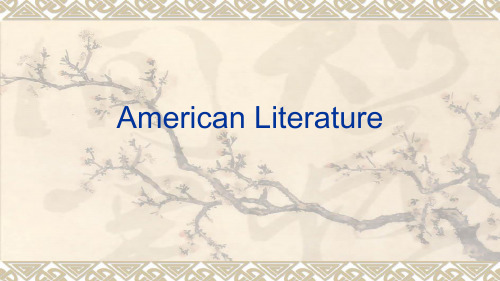
❖“The king died and then the queen died.”
❖ “The king died and then the queen
died of grief.”
1. What is Literature?
❖ Literature is characterized by beauty of expression and form and by university of intellectual and emotional appeal.
Other approaches(2)
❖ Post- structuralism ❖ Decostructuralism
❖ Our textbook is arranged in chronological order, but we deal with each period analytically with emphasis on theme.
4.How to Define American Literature
❖ American literature mainly refers to literature produced in American English by the people living in the US. This generalization does not exclude literature produced in other languages by American expatriates or literature produced in other languages by minorities in the country such as the American Indian literature in the Indian language and the Jewish American literature in the Yiddish language.
外国文学史 美国文学课件

美国文化特点
• 历史短暂,多民族混合成的移民国家 • 自由原则是最基本的美国原则,是美国传统的起源。自由原则
的代表是《独立宣言》,其执笔人杰弗逊(1743-1826)是美 国文化三大创建者之一
• 美国民族是一个重视行动,强调务实的民族,这种务实精神是 美国民族生存的法宝,并积淀成一种民族的品质。务实精神的 代表是富兰克林(1706-1790),美国文化三大创建者之一。
• 比彻·斯托夫人 (1811-1896) 《汤姆 叔叔的小屋》
豪威尔斯(1837-1920)
• 现实主义奠基人 • 长篇小说《现代婚姻》 • 提倡“微笑的现实主
义”,实际创作中往 往表现为对美国现实 生活的粉饰和美化
亨利·詹姆斯(1843-1916)
⑴国际小说:美国人和欧洲人 因为文化背景的不同而产 生的冲突。
霍桑(1804-1864)
• 长篇:《红字》《七个尖 角顶的房子》《福谷传奇》 《玉石雕像》等
• 短篇小说集《古宅青苔》 《雪影》
• 霍桑小说表现了清教文学 的传统,“人皆有罪”, 悲观思想浓郁
• “心理罗曼史”,擅长人 物的心理刻画,被认为是 美国文学心理分析小说的
开创者。
Nathaniel Hawthorne
&库柏(1789-1851)《皮袜子故事 集》(《最后一个莫希干人》)
超验主义运动
• 19世纪30、40年代, 美国产生了超经验主义 思想运动,它是浪漫主 义的理论。
• 爱默生(1803-1883) 《论自然》,反对权威, 崇尚直觉,其核心是主 张人能超越感觉和理性 直接认识真理。
• 梭罗(1817-1862) 《瓦尔登湖》,自然、 人以及超验主义理想交 融汇合,浑然一体。
文学“美国梦”
• 历史短暂,多民族混合成的移民国家 • 自由原则是最基本的美国原则,是美国传统的起源。自由原则
的代表是《独立宣言》,其执笔人杰弗逊(1743-1826)是美 国文化三大创建者之一
• 美国民族是一个重视行动,强调务实的民族,这种务实精神是 美国民族生存的法宝,并积淀成一种民族的品质。务实精神的 代表是富兰克林(1706-1790),美国文化三大创建者之一。
• 比彻·斯托夫人 (1811-1896) 《汤姆 叔叔的小屋》
豪威尔斯(1837-1920)
• 现实主义奠基人 • 长篇小说《现代婚姻》 • 提倡“微笑的现实主
义”,实际创作中往 往表现为对美国现实 生活的粉饰和美化
亨利·詹姆斯(1843-1916)
⑴国际小说:美国人和欧洲人 因为文化背景的不同而产 生的冲突。
霍桑(1804-1864)
• 长篇:《红字》《七个尖 角顶的房子》《福谷传奇》 《玉石雕像》等
• 短篇小说集《古宅青苔》 《雪影》
• 霍桑小说表现了清教文学 的传统,“人皆有罪”, 悲观思想浓郁
• “心理罗曼史”,擅长人 物的心理刻画,被认为是 美国文学心理分析小说的
开创者。
Nathaniel Hawthorne
&库柏(1789-1851)《皮袜子故事 集》(《最后一个莫希干人》)
超验主义运动
• 19世纪30、40年代, 美国产生了超经验主义 思想运动,它是浪漫主 义的理论。
• 爱默生(1803-1883) 《论自然》,反对权威, 崇尚直觉,其核心是主 张人能超越感觉和理性 直接认识真理。
• 梭罗(1817-1862) 《瓦尔登湖》,自然、 人以及超验主义理想交 融汇合,浑然一体。
文学“美国梦”
美国文学 ppt课件
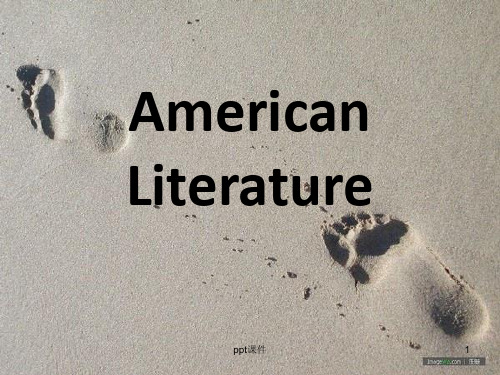
• Puritan opposition to pleasure and the arts sometimes has been exaggerated.
• Religious teaching tended to emphasize the image of a
wrathful GodOf Plymouth Plantation
ppt课件
8
Anne Bradstreet (安妮·布拉 德斯特里特) (1612-1672)
the first American woman poet
a Puritan poet, once called “Tenth Muse”
• The spiritual life in the colonies during that period was molded by the bourgeois Enlightenment.
ppt课件
11
2. Benjamin Franklin (1706-1790):
• The Autobiography • Poor Richard’s Almanack
the first American writer
A Description of New England 《新英格兰叙事》 (1616)
General History of Virginia《弗吉尼亚通史》 (1642)
• Pocahontas
ppt课件
7
William Bradford (1590-1657)
• Politics dominated the revolutionary phase of American writing.
• The crisis in American life carried by the Revolution made artists self-conscious about American subjects.
美国文学课件(Poe)
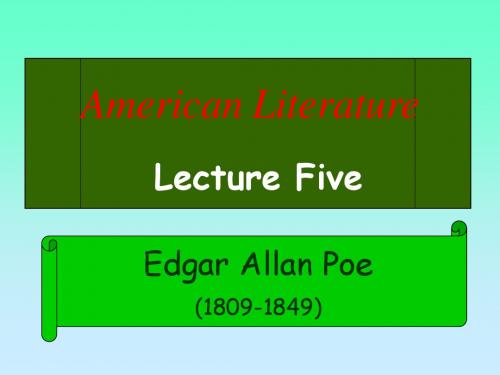
• As a verse narrative, the poem is characterized by its dramatic variation of tone, which starts from mournfulness, and then progresses to trepidation and jocularity, and eventually to despair by way of hysterical self-torture. • In spite of its completeness of plot as a verse narrative, it is also characterized by its highly symbolic trait, which frequently leaves the reader with a feeling that it is difficult to read, because of its lack of adequate suggestions of certain meanings.
• 1827, a volume of poems Tamerlane and Other Poems was published in Boston • 1829, Al Aaraaf, Tamerlane and Minor Poems, • 1831, Poems. • an editor first with The Southern Literary Messenger, later with such magazines as Graham’s and the Broadway Journal. • His marriage in 1835 to his first cousin, Virginia Clemn, deepened his financial difficulties. • 1839, “The Fall of the House of Usher” published in Burton’s Gentleman’s Magazine
艾米莉狄金森《美国文学》原创PPT课件
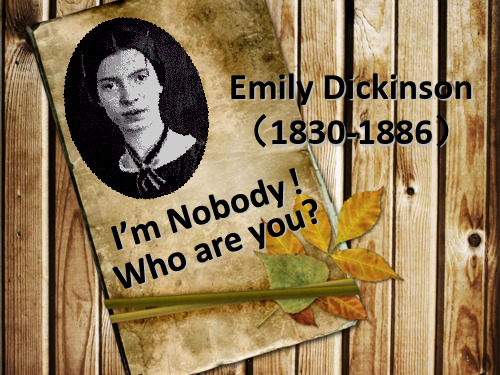
interest in Emily ‘s poems
. different nature
4
The Homestead
Emily Dickinson lived with her unmarried sister Lavinia in an elegant house called The Homestead(霍姆斯特德).
At the same time , Dickinson is widely acknowledged as an innovative pre-modernist poet as well as a rebellious and courageous woman.
迪金森的诗谜一般充满奇思妙想,展现出非凡的创造力与想象力。她的作品受到17世 纪英格兰玄学派诗人的影响,同时带有清教的家庭背景的烙印。虽然她不相信家庭的传统 宗教,但她研究了圣经,许多诗歌在形式上也类似圣经。她对破折号的热爱,不规则的韵 律和韵脚,超乎寻常的比喻使她当之无愧地成. 为19世纪美国文坛最具创新意识的诗人9。
A
promineGnrat vlaewaynedr
satnedrnpolitician(
我发生冲突。” Representative to Congress)
Same as their father’s career
Became ill when Emily was 25
Focus of attention and shows Close friend,though they share
.
14
Themes
On Nature
• Dickinson observed nature closely and described it vividly but never with the feeling of being lost in it, or altogether part of it, nor was she surprised when its creatures also kept their distance.
美国文学史课件 第一课分解

from a man who experienced it firsthand. • It establishes in literary form the first example of the
fulfillment of the American Dream. • It was one of the first autobiographies in the English language.
IV. Introduction to The Autobiography of Benjamin Franklin the unfinished record of his own life written by Benjamin
Franklin from 1771 to 1790 the “first”s: • It is considered the first popular self-help book ever published. • It was the first major secular American autobiography. • It is the first real account of American Dream in action as told
total depravity, and salvation of a selected few
(2) Franklin’s belief in self-examination and self-improvement
e.g. 13 virtues (Page 25-26)
Conceiving then, that, agreeably to the advice of Pythagoras in his Golden Verses, daily examination would be necessary… (Page 27)
fulfillment of the American Dream. • It was one of the first autobiographies in the English language.
IV. Introduction to The Autobiography of Benjamin Franklin the unfinished record of his own life written by Benjamin
Franklin from 1771 to 1790 the “first”s: • It is considered the first popular self-help book ever published. • It was the first major secular American autobiography. • It is the first real account of American Dream in action as told
total depravity, and salvation of a selected few
(2) Franklin’s belief in self-examination and self-improvement
e.g. 13 virtues (Page 25-26)
Conceiving then, that, agreeably to the advice of Pythagoras in his Golden Verses, daily examination would be necessary… (Page 27)
美国文学及其特色课件

? 多样性的内容和形式 ? 强烈的个人色彩,强调个人的
独特性和反对权威的精神 ? 对社会弊端严厉的批评和谴责
6
最早的美洲移民包括:
? 精明的英国商人 ? 到新大陆追求自由、逃避死刑的罪犯 ? 寻求建立一个新的资产阶级样板社会的清教
徒
美国民族的特点
? 经商的干劲 ? 追求自由的理想 ? 宗教热忱
7
美国文学的共性
11
开放性结尾
马克·吐温 Mark Twain 《哈克贝里·费恩历险记》
詹姆斯 James 《女士的画像》
The Portrait of a Lady 德莱塞 Dreiser
《嘉莉妹妹》Sister Carrie 海明威 Hemingway
《老人与海》
The Old Man and the Sea
10
少年成长的故事
马克·吐温 Mark Twain 《哈克贝里 ·费恩历险记》
Adventures of Huckleberry Finn 克莱恩 Crane
《红色英勇勋章》
The Red Badge of Courage 塞林格 Salinger
《麦田的守望者》
The Catcher in the Rye
《自传》(Autobiography, 1818 )
纳撒尼尔·霍桑 (Nathaniel Hawthorne)
《红字》(The Scarlet Letter, 1850)
斯托夫人(Harriet Beecher Stowe)
《汤姆叔叔的小屋》(Uncle Tom's Cabin ,1852 )
赫尔曼·梅尔维尔 (Herman Melvi30 1936 1938 1949 1954 1962 1976 1978
独特性和反对权威的精神 ? 对社会弊端严厉的批评和谴责
6
最早的美洲移民包括:
? 精明的英国商人 ? 到新大陆追求自由、逃避死刑的罪犯 ? 寻求建立一个新的资产阶级样板社会的清教
徒
美国民族的特点
? 经商的干劲 ? 追求自由的理想 ? 宗教热忱
7
美国文学的共性
11
开放性结尾
马克·吐温 Mark Twain 《哈克贝里·费恩历险记》
詹姆斯 James 《女士的画像》
The Portrait of a Lady 德莱塞 Dreiser
《嘉莉妹妹》Sister Carrie 海明威 Hemingway
《老人与海》
The Old Man and the Sea
10
少年成长的故事
马克·吐温 Mark Twain 《哈克贝里 ·费恩历险记》
Adventures of Huckleberry Finn 克莱恩 Crane
《红色英勇勋章》
The Red Badge of Courage 塞林格 Salinger
《麦田的守望者》
The Catcher in the Rye
《自传》(Autobiography, 1818 )
纳撒尼尔·霍桑 (Nathaniel Hawthorne)
《红字》(The Scarlet Letter, 1850)
斯托夫人(Harriet Beecher Stowe)
《汤姆叔叔的小屋》(Uncle Tom's Cabin ,1852 )
赫尔曼·梅尔维尔 (Herman Melvi30 1936 1938 1949 1954 1962 1976 1978
《文学美国文学》PPT课件
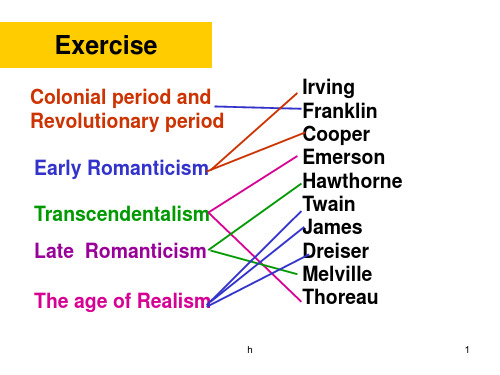
因为人类的祖先亚当和夏娃是有罪的),
total depravity(人类是完全堕落的,所以
人要处处小心自己的行为,要尽可能做到
最好以取悦上帝), limited atonement (有
限救赎,只有被上帝选中的人才能得到上
帝的拯救)
h
3
American Puritanism
Features of American Puritan
h
8
2. Early American Puritan Writers
• John Smith, one of the founders of the colony of Jamestown: His descriptions about the new world became the source of information for the later settlers.
Exercise
Colonial period and Revolutionary period Early Romanticism Transcendentalism Late Romanticism
The age of Realism
Irving Franklin Cooper Emerson Hawthorne Twain James Dreiser Melville Thoreau
himself to writing Amh erican subject
12
2. Evaluation. (Benjamin Franklin1706 – 1790)
1) He was a rare genius in human history. Everything seems to meet in this one man, mind and will, talent and art, strength and ease, wit and grace, and he became almost everything: a printer, postmaster, citizen, almanac maker, essayist, scientist, inventor, statesman, philosopher, political economist and ambassador.
《美国文学》课件.ppt

3
• When he woke up, he noticed that his joints were stiff and that his beard had grown a foot long. Returning to his village, he found it changed almost beyond recognition.
7
3) What does “this legendary superstition” refer to? (Para. 2) 4) What is “the general purport of this legendary superstition”? (Para. 3—Para. 4)
8
5) Is the “Legend of Sleepy Hollow” the story of the Headless Horseman? If not, what does the “Legend of Sleepy Hollow” deal with?
10
Literary Terms: 1.Protagonist: The leading character in a play or story, originally the leader of the CHORUS in the AGON (“contest”) of Greek drama, faced with the ANTAGONIST, the opposition.
9
6) How many major characters are mentioned in the “legend”? Who are they? And what’s the relationship between them? Who is the protagonist? And who is the antagonist?
• When he woke up, he noticed that his joints were stiff and that his beard had grown a foot long. Returning to his village, he found it changed almost beyond recognition.
7
3) What does “this legendary superstition” refer to? (Para. 2) 4) What is “the general purport of this legendary superstition”? (Para. 3—Para. 4)
8
5) Is the “Legend of Sleepy Hollow” the story of the Headless Horseman? If not, what does the “Legend of Sleepy Hollow” deal with?
10
Literary Terms: 1.Protagonist: The leading character in a play or story, originally the leader of the CHORUS in the AGON (“contest”) of Greek drama, faced with the ANTAGONIST, the opposition.
9
6) How many major characters are mentioned in the “legend”? Who are they? And what’s the relationship between them? Who is the protagonist? And who is the antagonist?
《美国文学》课件song of myself 1
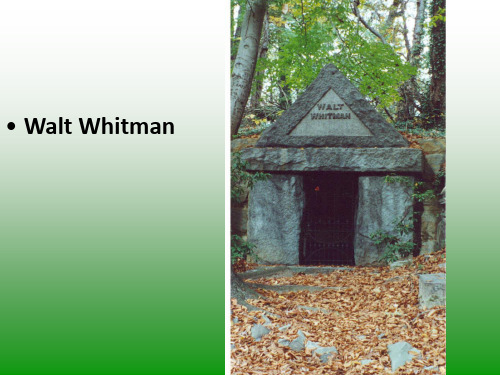
selves, ➢ the poet’s relationship with the elements
of nature and the universe.
Beat! Beat! Drums!
• Beat! Beat! Drums! Blow! Bugles! Blow! Through the windows---through doors---burst like a ruthless force, Into the solemn church, and scatter the congregation, Into the school where the scholar is studying; Leave not the bridegroom quiet---no happiness must he have now with his bride. Nor the peaceful farmer any peace, ploughing his field or gathering his grain, So fierce you whirr and pound you drums---so shrill your bugles blow.
• 信条和学派暂时不论, 且后退一步,明了它们 当前的情况已足,但也 决不是忘记,
不论我从善从恶,我允 许随意发表意见,
顺乎自然,保持原始的 活力。
An analysis of Song of myself
Three important themes : ➢ the idea of the self ; ➢ the identification of the self with other
Beat! Beat! Drums!
of nature and the universe.
Beat! Beat! Drums!
• Beat! Beat! Drums! Blow! Bugles! Blow! Through the windows---through doors---burst like a ruthless force, Into the solemn church, and scatter the congregation, Into the school where the scholar is studying; Leave not the bridegroom quiet---no happiness must he have now with his bride. Nor the peaceful farmer any peace, ploughing his field or gathering his grain, So fierce you whirr and pound you drums---so shrill your bugles blow.
• 信条和学派暂时不论, 且后退一步,明了它们 当前的情况已足,但也 决不是忘记,
不论我从善从恶,我允 许随意发表意见,
顺乎自然,保持原始的 活力。
An analysis of Song of myself
Three important themes : ➢ the idea of the self ; ➢ the identification of the self with other
Beat! Beat! Drums!
《美国文学》课件一
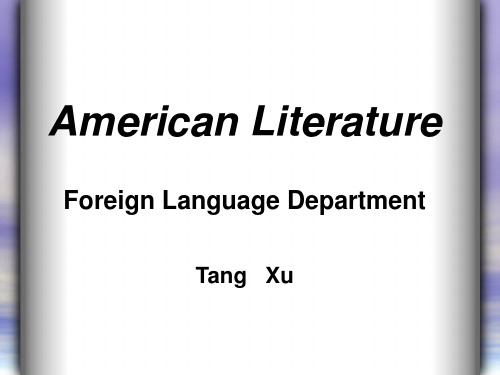
• 1. American literature grew out of humble origins. • 2.Diaries, histories, journals, letters, commonplace books, travel books, sermons, in short, personal literature in its various forms, occupy a major position in the literature of the early colonial period.
V. The Survey of Selected Readings in American Literature
• 2. Henry David Thoreau (1817-1862) was at first a faithful follower of Emerson, but alienated himself somewhat from the master later on. • 3. Another of Emerson's contemporaries, Walt Whitman (1819-1892), tried to write poetry describing the native American experience. • 4. Whitman and Dickinson were the two major American poets of the nineteenth century.
批注本地保存成功开通会员云端永久保存去开通
American Literature
Foreign Language Department
Tangmerican Literature
V. The Survey of Selected Readings in American Literature
• 2. Henry David Thoreau (1817-1862) was at first a faithful follower of Emerson, but alienated himself somewhat from the master later on. • 3. Another of Emerson's contemporaries, Walt Whitman (1819-1892), tried to write poetry describing the native American experience. • 4. Whitman and Dickinson were the two major American poets of the nineteenth century.
批注本地保存成功开通会员云端永久保存去开通
American Literature
Foreign Language Department
Tangmerican Literature
美国文学史课件 第一课分解

2. a statesman and diplomat one of the Founding Fathers of the United States the First American for his early campaigning for colonial unity an author and spokesman in London for several colonies the first United States Ambassador to France The governor of Philadelphia
colonies in the period 1714–1818 applied scientific reasoning to politics, science, and religion promoted religious tolerance restored literature, the arts, and music as important
and astrological information
proverbs from the Almanack: • A penny saved is a penny earned. • Early to bed, and early to rise, makes a man healthy, wealthy and
wise. • God helps those who help themselves. • Beware of little expenses: a small leak will leak a great ship. • Eat to live, and not live to eat. • Be slow in choosing a friend, slower in changing. • Nothing is certain in this world except death and taxes. • Never leave that tomorrow which you can do today. • Sloth, like rust, consumes faster than labor wears. • Love your enemies for they tell you your faults. • Glass, China and Reputation are easily cracked and never well
美国文学 PPT课件

➢ Chapter II Revolutionary Period
Benjamin Franklin Philip Freneau
➢ Chapter III American Romanticism
Washington Irving James Fenimore Cooper William Cullen Bryant Edgar Allan Poe Nathaniel Hawthorne
Brief Outline of American literature
1. Colonial period (1607-1775)
Anne Bradstreet Edward Taylor
2. Revolutionary period
(1775-1783) Benjamin Franklin Philip Freneau
The early settlers
❖ Christopher Columbus discovered the American continent in 1492.
❖ Captain John Smith reached Jamestown, Virginia in 1607.
❖ Puritans came the New England area, by Mayflower in 1620.
❖ Literature is characterized by beauty of expression and form and by universality of intellectual and emotional appeal.
2. Forms (genres) of literature? Poetry, novel (fiction), drama, prose, essay, epic, elegy, short story, journalism, ts, novelette, etc.
Benjamin Franklin Philip Freneau
➢ Chapter III American Romanticism
Washington Irving James Fenimore Cooper William Cullen Bryant Edgar Allan Poe Nathaniel Hawthorne
Brief Outline of American literature
1. Colonial period (1607-1775)
Anne Bradstreet Edward Taylor
2. Revolutionary period
(1775-1783) Benjamin Franklin Philip Freneau
The early settlers
❖ Christopher Columbus discovered the American continent in 1492.
❖ Captain John Smith reached Jamestown, Virginia in 1607.
❖ Puritans came the New England area, by Mayflower in 1620.
❖ Literature is characterized by beauty of expression and form and by universality of intellectual and emotional appeal.
2. Forms (genres) of literature? Poetry, novel (fiction), drama, prose, essay, epic, elegy, short story, journalism, ts, novelette, etc.
美国文学史总结PPT课件

人之福,也是众人之父“a common blessing and father to them all”
2019/9/12
6
John Winthrop
John Winthrop:《新英格兰历史》“The History of New England”. 1630年登上“阿贝亚”(Arbella)to Massachusetts并开始写日记keep a journal
其还是美国第一位主要作家the first major writer非凡表达能力,简洁明了,有点幽默,还是一位讽 刺天才as an author he had power of expression, simplicity, a subtle humor. He was also sarcastic.
美国早期文学主要为the narratives and journals of these settlements采用in diaries and in journals(日记和日志),他们写关于the land with dense forests and deep-blue lakes and rich soil.
2019/9/12
10
Edward Taylor
清教徒诗人中最杰出的一位the best of the Puritan poets 他的作品遵循了十七世纪中期一些杰出诗人风格和形式his work followed they
style and forms of the leading English poets of the mid-seventeenth century。 他大部分作品关于宗教的,大部分诗歌直接以赞美诗为基础进行创作的most of
2019/9/12
2019/9/12
6
John Winthrop
John Winthrop:《新英格兰历史》“The History of New England”. 1630年登上“阿贝亚”(Arbella)to Massachusetts并开始写日记keep a journal
其还是美国第一位主要作家the first major writer非凡表达能力,简洁明了,有点幽默,还是一位讽 刺天才as an author he had power of expression, simplicity, a subtle humor. He was also sarcastic.
美国早期文学主要为the narratives and journals of these settlements采用in diaries and in journals(日记和日志),他们写关于the land with dense forests and deep-blue lakes and rich soil.
2019/9/12
10
Edward Taylor
清教徒诗人中最杰出的一位the best of the Puritan poets 他的作品遵循了十七世纪中期一些杰出诗人风格和形式his work followed they
style and forms of the leading English poets of the mid-seventeenth century。 他大部分作品关于宗教的,大部分诗歌直接以赞美诗为基础进行创作的most of
2019/9/12
《美国文学》教学课件Literature of the Eighteenth Century
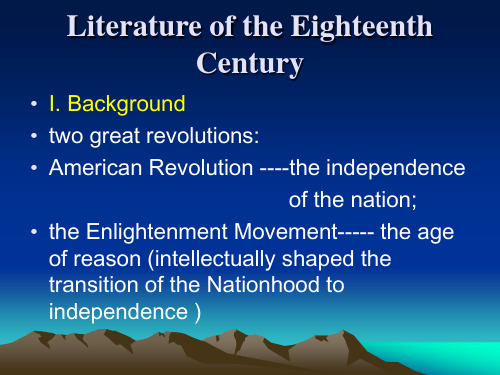
• Poor Richard’s Almanack • An almanack is a book that gives vital
information for the years, the seasons, the sunrise and the sunset, accurate information on tides, as well as information on how to plant certain crops , how to cure hens, etc. all are practical information important to farmers.
The History and the Influence of Enlightenment
2.Newtonian ideas:
a. The universe is seen as a mechanism operating by a rational formula or by unchanging laws available to intelligent humans.
3.The Influence of the Newtonian ideas:
C. Americans believed that more reasonable political and social orders should be established.
D. Americans also learned to take actions to resist oppressive power and to criticize and reform government.
Autobiography
• C. The Autobiography is also an eloquent education of the ideas of the 18th.c. Using his life story as a shining example, Franklin eloquently demonstrated all the major principles of the enlightenment in America.
information for the years, the seasons, the sunrise and the sunset, accurate information on tides, as well as information on how to plant certain crops , how to cure hens, etc. all are practical information important to farmers.
The History and the Influence of Enlightenment
2.Newtonian ideas:
a. The universe is seen as a mechanism operating by a rational formula or by unchanging laws available to intelligent humans.
3.The Influence of the Newtonian ideas:
C. Americans believed that more reasonable political and social orders should be established.
D. Americans also learned to take actions to resist oppressive power and to criticize and reform government.
Autobiography
• C. The Autobiography is also an eloquent education of the ideas of the 18th.c. Using his life story as a shining example, Franklin eloquently demonstrated all the major principles of the enlightenment in America.
美国文学课件

1.Chinese characters as an ideal medium for poetry Confucius as an effective cure for the disease of his times. 2.The Chinese writing system most closely met his ideals. He used Chinese ideograms to represent "the thing in pictures", and he learned that plot could be replaced with "the intensification of a single image". 3.His technique came from classical Chinese and Japanese poetry. On one hand the stressed clarity, precision, and economy of language. On the other hand, Pound mused the traditional rhyme and meter in order to, as Pound put it, “compose in the sequence of the musical phrase, not in the sequence of metronome”.
1.Dreams of fame broke up, so she escaped from reality. At first, Dickinson was eager to get her work recognized by the world, but her poems were considered “too ethereal(飘渺的), not suitable to be published.” Thus, she developed the idea that "publication" is "auction soul“ and lived in solitude in order to protect her creative uniqueness. This had obvious masochistic (自虐的) tendencies. 2.Her love failure contributed to her recluse. Dickinson was in her birthplace almost her whole lifetime. Like her younger sister, they both didn’t marry. Through her lifetime, there are two important people for whom she felt an affection. One is her teacher Charles Wadsworth, the other her sister-in-law, Susan. 3.Transcending the Conflicts(二元对立的超越) Poet‘s spiritual world were filled with dreams and reality, life and death, love and celibacy(独身), religious popularity and her skepticism.
美国文学及其特色 PPT课件
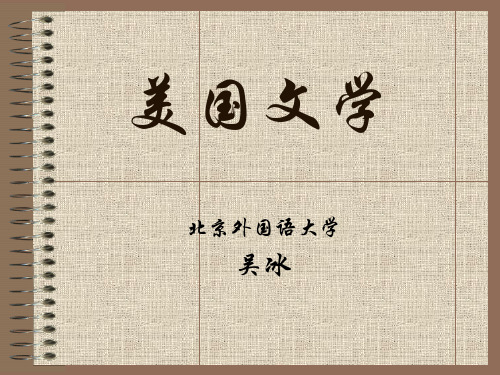
美国文学的共性
• 经常出现的“美国梦”主题 • 作品主题或文学体裁往往和美国的
地理、历史有关 • 个人和社会的冲突和矛盾、社会进
步毁坏了大自然和人的天性 • 少年成长的故事(initiation story) • 开放性结尾
美国梦American Dream
菲兹杰拉德/F. Scott Fitzgerald 《了不起的盖茨比》
美国文学
北京外国语大学
吴冰
美国文学
第一讲 美国文学及其特色
第二讲 马克·吐温的 《哈克贝利·费恩历险记
第三讲 20世纪亚裔美国文学 的兴起
美国文学及其特色
• 美国诺贝尔文学奖得主 • 美国文学的特色 • 美国文学的共性 • 理解、欣赏美国文学应具备的背景知识 • 学习方法 • 推荐书目 • 参考书 • 思考题
少年成长的故事
马克·吐温 Mark Twain 《哈克贝里·费恩历险记》 Adventures of Huckleberry Finn
克莱恩 Crane 《红色英勇勋章》 The Red Badge of Courage
塞林格 Salinger 《麦田的守望者》
The Catcher in the Rye
Huckleberry Finn, 1884)
推荐书目
西奥多·德莱塞(Theodore Dreiser) 《嘉莉妹妹》(Sister Carrie, 1900)
司各脱·菲兹杰拉德 (F. Scott Fitzgerald) 《了不起的盖茨比》(The Great Gatsby, 1925) 厄纳斯特·海明威 (Ernest Hemingway) 《太阳照样升起》(The Sun Also Rises, 1926) 《永别了,武器》(A Farewell to Arms, 1929) 《老人与海》(The Old Man and the Sea, 1952) 托妮·莫里森 (Toni Morrison) 《宠儿》(Beloved, 1987) 汤亭亭(Maxine Hong Kingston) 《中国佬》(China Men, 1980)
美国文学第一讲introduction PPT

Periods of American Literature
1. The early A. literature (Colonial period & early national and revolutionary period ) (1607-1783)
2. The age of Romanticism (1783-1865) 3. The age of Realism & Naturalism (1865-
Literature Root and Flower, Foreign
Language Teaching and Research Press,
1988
Shared mailbox
Code: 20090214
5. Walt Whitman & His poems (Week 11) 6. Emily Dickinson& Her poems (Week 12) 7. Nathaniel Hawthorne & The Minister’s
Black Veil (Week 14) 8. Herman Melville & Moby Dick (Week 15) 9. Edgar Allan Poe & His Works (Week 17)
Week 14 The Minister’s Black Veil Week 15 Herman Melville Week 16 Edgar Allan Poe Week 17 To Helen
Requirement of the course
You are supposed to do your HOMEWORK Final marks: class performance (40%)+ final
美国文学第一章课件 American_History.ppt 2
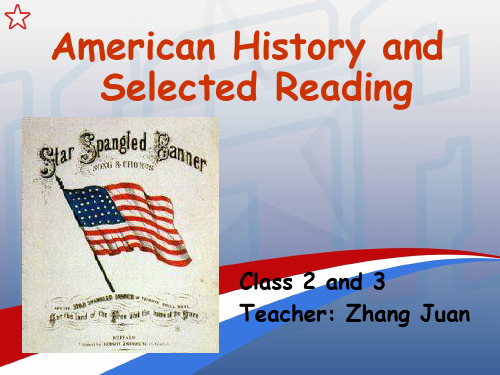
•
▲ late:
1. The literature of colonial America (1607 mid-18th)
◆American Puritanism: Puritanism is the practices and beliefs
of the puritans. Quite a few of the early British settlers were Puritans. They were members of the Church of England, who aimed at reforms in its doctrines and strictness in religious disciplines and were persecuted. To avoid the religious Persecution, some of them managed to escape to the New world and became known as Puritan Fathers.
• Pilgrim Fathers
In 1620, a tiny ship called the “May flower” sailed from England for the New world, with 102 passengers. 50% were Pilgrims. Landed in what is now Plymouth, Massachusetts.
亚美瑞格. 亚美瑞格.韦斯普奇号是意大利海军的一 艘高桅横帆船, 艘高桅横帆船,她的名字来源于探险家 亚美瑞格.韦斯普奇(伟大的航海家 航海家, 亚美瑞格.韦斯普奇(伟大的航海家, 1497年到1504年 年到1504 从1497年到1504年 Amerigo Vespucci 曾四次到南美洲进行探险航行。 曾四次到南美洲进行探险航行。他对于 所到达的国家做了非常细致的描述。 所到达的国家做了非常细致的描述。这 些文字在欧洲流传甚广并给他带来极大 的声誉: 的声誉:人们认为他是真实的美洲的发现者
▲ late:
1. The literature of colonial America (1607 mid-18th)
◆American Puritanism: Puritanism is the practices and beliefs
of the puritans. Quite a few of the early British settlers were Puritans. They were members of the Church of England, who aimed at reforms in its doctrines and strictness in religious disciplines and were persecuted. To avoid the religious Persecution, some of them managed to escape to the New world and became known as Puritan Fathers.
• Pilgrim Fathers
In 1620, a tiny ship called the “May flower” sailed from England for the New world, with 102 passengers. 50% were Pilgrims. Landed in what is now Plymouth, Massachusetts.
亚美瑞格. 亚美瑞格.韦斯普奇号是意大利海军的一 艘高桅横帆船, 艘高桅横帆船,她的名字来源于探险家 亚美瑞格.韦斯普奇(伟大的航海家 航海家, 亚美瑞格.韦斯普奇(伟大的航海家, 1497年到1504年 年到1504 从1497年到1504年 Amerigo Vespucci 曾四次到南美洲进行探险航行。 曾四次到南美洲进行探险航行。他对于 所到达的国家做了非常细致的描述。 所到达的国家做了非常细致的描述。这 些文字在欧洲流传甚广并给他带来极大 的声誉: 的声誉:人们认为他是真实的美洲的发现者
- 1、下载文档前请自行甄别文档内容的完整性,平台不提供额外的编辑、内容补充、找答案等附加服务。
- 2、"仅部分预览"的文档,不可在线预览部分如存在完整性等问题,可反馈申请退款(可完整预览的文档不适用该条件!)。
- 3、如文档侵犯您的权益,请联系客服反馈,我们会尽快为您处理(人工客服工作时间:9:00-18:30)。
This tradition continued into the following century, when Puritan Jonathan Edwards and non-Puritans such as Phillis Wheatley and John Woolman reflected on their faith in poems and journals. Other writers, including Benjamin Franklin and Thomas Jefferson, produced more public literature designed to entertain people or further their political aims. In its emphasis on human potential and reason, much of this literature reflects the prevailing sentiments of its era, often called the Enlightenment or the Age of Reason.
Being thus passed the vast ocean, and a sea of troubles...they had now no friends to welcome them nor inns to entertain or refresh their weatherbeaten bodies; no houses or much less towns to repair to, to seek for succor...savage barbarians...were readier to fill their sides with arrows than otherwise. And for the reason it was winter, and they that know the winters of that country know them to be sharp and violent, and subject to cruel and fierce storms...all stand upon them with a weatherbeaten face, and the whole country, full of woods and thickets, represented a wild and savage hue (William Bradford’s diary about his first view of the colony)
Literature of the Colonists
The first writings that we call American were the narratives and journals of the settlers. They wrote about their voyage to the new land, about adopting themselves to unfamiliar climates and crops, about dealing with Indians. They wrote in diaries and in journals. They wrote letters and contracts and government charters and religious and political statements. They wrote about the land which stretched before them with rich dense forest and deep-blue lakes and rich soil. Among these none-too-remarkable documents protrude the reports of Captain John Smith, whose reports of exploration, published in the early 1600s, have been described as the first distinctly American literature to be written in English.
Some central themes emerge from this literature. Because of the nature of their endeavor, for example, Captain John Smith and other chroniclers of settlement in the 17th century often addressed the subjects of will and work, the relationship between humans and nature, and the differences between European and Native American cultures. In this same century, Puritans such as Anne Bradstreet and John Winthrop wrote about their spiritual feelings and quests, Bradstreet in very personal poems and a journal, Winthrop in both a famous public sermon and an intimate journal.
IN THE name of God, Amen. We whose names are underwritten, the loyal subjects of our dread sovereign Lord, King James, by the grace of God, of Great Britain, France and Ireland king, defender of the faith, etc., having undertaken, for the glory of God, and advancement of the Christian faith, and honor of our king and country, a voyage to plant the first colony in the Northern parts of Virginia, do by these presents solemnly and mutually in the presence of God, and one of another, covenant and combine ourselves together into a civil body politic, for our better ordering and preservation and furtherance of the ends aforesaid; and by virtue hereof to enact, constitute, and frame such just and equal laws, ordinances, acts, constitutions, and offices, from time to time, as shall be thought most meet and convenient for the general good of the colony, unto which we promise all due submission and obedience. In witness whereof we have hereunder subscribed our names at Cape-Cod the 11 of November, in the year of the reign of our sovereign lord, King James, of England, France, and Ireland the eighteenth, and of Scotland the fifty-fourth. Anno Domine 1620.
American Literature of the Colonial Period
Background and Distinguished Writer
Historical Background
Striving for Colonies European nations came to the Americas to increase their wealth and broaden their influence over world affairs. The Spanish were among the first Europeans to explore the New World and the first to settle in what is now the United States. By 1650, however, England had established a dominant presence on the Atlantic coast.
The Mayflower Compact
The Mayflower Compact was drawn up on the Mayflower, under these circumstances as described by Gov. William Bradford: "This day, before we came to harbor, observing some not well affected to unity and concord, but gave some appearance of faction, it was thought good there should be an association and agreement, that we should combine together in one body, and to submit to such government and governors as we should by common consent agree to make and choose, and set our hands to this that follows, word for word. . ."
